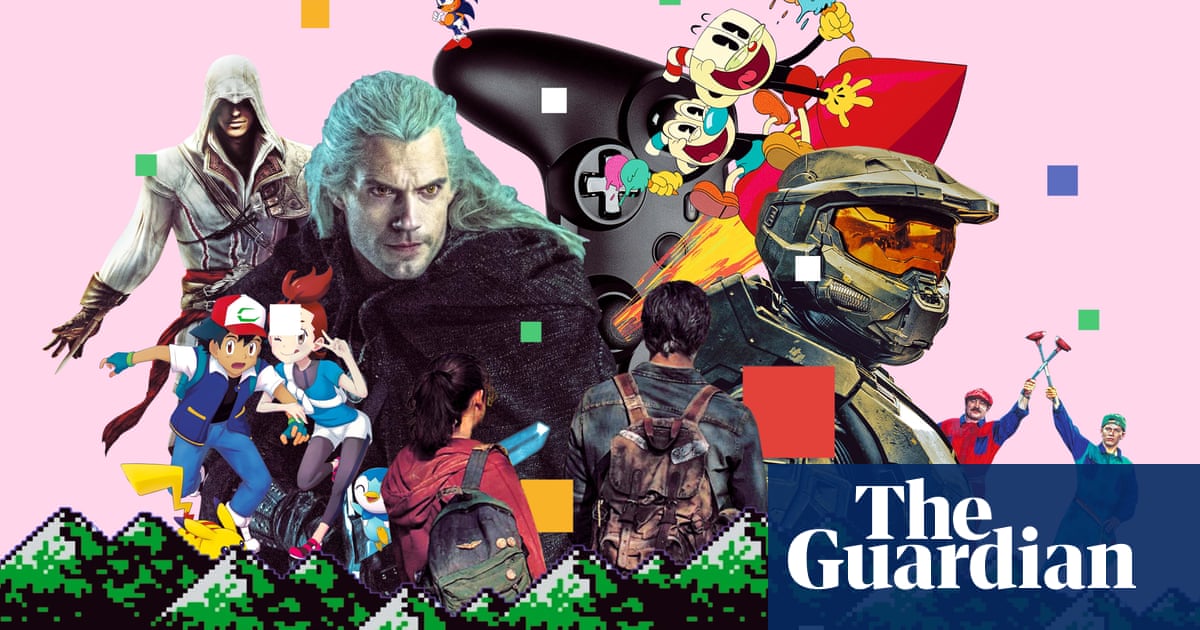
For a long time, it was an accepted truth that video games just didn’t work on screen. Remember the quasi-cyberpunk 1993 Super Mario movie, starring Dennis Hopper? It was so bad that basically everyone involved with it has disavowed it. And TV? Kids of the 90s will remember the incredibly annoying voice of Sonic the Hedgehog on Saturday morning TV – or the permanent repeats of the Pokémon anime series – but other than that, the entertainment world never took games seriously.
Now, though, things are different. In the past few years, Hollywood has managed to produce a few video-game films that are actually watchable, such as Detective Pikachu and Sonic the Hedgehog 2. And barely a week goes by without an announcement that another game has been picked up for TV – all of which are aimed at adults, not kids or tweens. There’s a science fiction series based on Halo, the first-person shooter from 2001 whose original fans are well into their 30s and beyond. There’s a Netflix adaptation of Assassin’s Creed, the historical action game that makes you run around in elaborate simulations of ancient Egypt or Renaissance Italy – which adds to the streaming giant’s 15-rated take on The Witcher, starring Henry Cavill, which is almost as filthy and violent as its source material. And in an Inception-level example of games and TV inspiring each other, there’s even a series based on Cuphead, a well-loved but niche run-and-gun game that is itself a homage to early 1920s cartoons.
What has changed? Why is the TV world suddenly so interested in shows based on games? And this time, will they be any good?

The simplest explanation for the boom of game adaptations is, predictably, money. Video games are bigger business than ever before – the games industry was worth $175bn in 2021 (for context, the entire global movie industry is worth $100bn). The audience who play them have also grown up since the Pokémon heyday; 80% of US video game players are over 18 and more than half of them – 52% – are between 18 and 45, the “key demographic” TV executives love most.
“Video games have evolved from a fringe activity to mainstream entertainment, and Netflix is looking to retain and acquire subscribers by plugging into what’s popular with younger audiences,” says longstanding games industry researcher Joost van Dreunen. “As streaming services compete over content, they look for categories to give them an edge. So HBO and Amazon Prime have been developing game-based series … When done properly and taken seriously, these adaptations can serve everyone, including the audience.”
That last point is crucial: audiences (and critics) can smell it a mile off when a show is a cynical cash-in. Helpfully, the first generations that grew up with games are now in their 40s and 50s and have aged into power: speaking to people in the TV and games industries, it is clear the writers and directors of these new shows are people who actually play games, and genuinely love the source material – such as Supernatural showrunner Andrew Dabb, who is heading up the Netflix Resident Evil series that premieres in July, and says it’s his “favourite game of all time”. They appreciate video games in all their empowering, exciting and often unintentionally hilarious weirdness. There ’s a much better chance they’ll make TV worth watching.

Nonetheless, when a game gets picked up for TV, the original creative team are often not involved. So the people who spent years creating the game itself – on big-budget projects, the narrative team alone can comprise 10 or 20 people – are usually left sitting nervously on the sidelines. That can be a nerve-wracking experience, especially given the track record. Bruce Straley was the co-creator of Naughty Dog’s hard-hitting, critically acclaimed post-apocalyptic game The Last of Us, the tale of a teenage girl called Ellie and her reluctant father figure Joel on a journey across the devastated remnants of America. When The Last of Us was picked up by HBO in 2020, he had mixed feelings.
“Years ago, we used to think that to have a movie made about a game we worked on was ‘making it’. I don’t think that any more,” he says. “Our industry has proven its value and doesn’t need other mediums to validate us … I don’t have a problem with adaptations. But in my – and I think all of our – experience, something always falls short with the execution … I know very little about the production, but it’s hard for me to fully endorse it.”
This is partly due to the difference between writing for games and for TV. “With The Last of Us, I wanted the player to feel the same feelings Joel and Ellie might be feeling at any given moment,” says Straley. “That meant the player had to be 100% there throughout their journey, participating in all the ups and downs, turns and surprises of their survival, and their joys. I believed that taking as much story out of cutscenes [non-interactive sequences] and creating playable scenes instead enabled us to create a significantly more impactful experience than I ever could in a TV show or film. So we have to ask, what makes a game great? And will an adaptation add to the core experience or diminish it?”

The gulf between writing for a linear medium such as TV and an interactive one like games is at the heart of what makes these adaptations so difficult. “With film and TV, every single moment is precious. If something is not in service to the greater narrative, it’s gonna get cut,” says Sam Winkler, a senior writer at Gearbox Entertainment, creators of the Borderlands series – most recently Tiny Tina’s Wonderlands, a madcap Dungeons and Dragons-inspired adventure through the mind of a cheerful teen psychopath. “In games there’s so much more breathing room, and I think that’s why the comedy has such a different flavour. In Borderlands we have to be ready for the player to do some weird thing in the middle of the main story, we have to be ready for a joke to pop off at any time, and it has to read well in any situation.”
As a result, the best adaptations are often ones that focus on channelling the atmosphere of the original game, rather than obsessing over their plot. “The ones that people have responded well to, like the Castlevania TV series, take the setting and characters and try to give viewers the feeling players had the first time they played these games, without sticking rock-solid to the story,” says Winkler. “That’s the biggest mistake anyone makes – and I’m honestly surprised that people keep making it – it’s kind of wild. Of course, it all depends on how something gets greenlit: is it a passion project from someone who played the games and wants to bring it to life? Or an executive noticing that games are making more money than movies saying we gotta get a piece of that? It’s sad when a project is a cash grab. You can always tell when the people behind a project care and understand the source material.”

This guarded scepticism is repeated by most people in the games industry when we talk about adaptations – and it’s not unwarranted. Game developers, long patronised by the rest of the entertainment industry, wonder what motivation the TV world has to do their stories justice. I hear several stories of painful, tone-deaf pitches from production companies with no idea what a studio’s games were about. “One outfit put together a teaser for a proposed adaptation of The Last of Us that was this on-the-nose, B-movie, slasher/horror film,” says Straley. “It was so beyond their conception that a post-apocalyptic game could generate genuine emotions.”
Admittedly, games have not always had the kind of stories or characters that provoke reflection or empathy (has anyone ever thought much about the motivations of Doom’s demon-killing supersoldier?). But these days they do – another reason, perhaps, that the TV world is showing more interest. The challenge now for people making shows based on games is not to wring a good script out of paper-thin plots; it’s to honour the genuine emotional connection players feel when they’re in a character’s shoes, with a gamepad in their hands.

“The awesomest thing and the hardest thing about games is the interactivity,” says Straley. “It’s so powerful to be able to pull the player into a world and let them craft an experience of their own. I truly believe that there’s a different mental wiring, and a different connection, than when we sit in front of a TV. With this power comes a ton of problems for developers. It’s one of the hardest mediums to work in, if you care about telling a quality story, and if you really think about what it takes to make a good story in a game, it’s pretty baffling that it ever works! But when it does, it’s pure magic.
“We have to ask ourselves: what’s the purpose of a game-to-screen adaptation? I don’t want the lesser version of the game experience – I want something that introduces new fans to what makes that game great.”
Resident Evil is on Netflix on 14 July; Halo will be on Paramount+ in the summer











































































